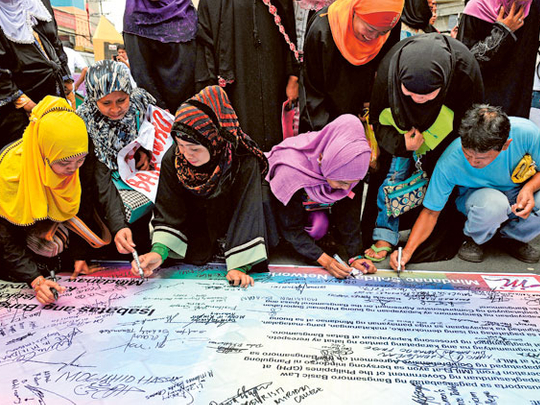
Manila: The Philippine president submitted a draft law to Congress on Wednesday that aims to end four decades of rebellion by Muslims in the south by granting them more autonomy in a region that will have its own flag, government, and police force.
The Philippine government and representatives of the Moro Islamic Liberation Front (MILF) forged a political settlement in March this year.
President Benigno Aquino submitted to the two houses of Congress the draft of a proposed law that will enhance Filipino-Muslim’s governance in an enlarged autonomous area in Mindanao, southern Philippines.
Calling for the “urgent passage” of the Bangsamoro Basic Law in the House of Representatives and the Senate by end of 2014, Aquino said, “This, I believe, is the great legacy we work toward, a legacy we proudly can bequeath to the next generation of Filipinos.”
“Through the pursuit of a peace founded on justice, we now cast away the divisions of the past (between Christians and Muslims), and, thus, forge a more prosperous, more inclusive region,” Aquino said with optimism, adding, “The changing face of Mindanao [in the south] is among our greatest sources of pride. It is a region that once was mired in strife but will soon realise its dreams of peace and prosperity, of innovation and advancement, of being a wellspring of opportunity for its peoples.”
Accompanied by MILF chief negotiator Mohagher Iqbal, presidential adviser on the peace process Teresita Quintos-Deles, and executive secretary Paquito Ochoa, Aquino endorsed the proposed law to Senate President Franklin Drilon and to House Speaker Feliciano Belmonte.
In response, Drilon promised, “We will work on it double time. We will give it the highest priority so we can pass it with enough time for ratification so the new entity will be in place by July 1, 2016.”
House Speaker Belmonte expressed the same sentiment.
“Our champions of peace in Congress promised to approve the bill,” said Deles, in reaction to criticism that the passage of the proposed law calls for consitutional changes.
The proposed law, drafted by a 14-man Bangsamoro Transition Commission (BTC) which is headed by Iqbal, was reviewed by the office of the president twice, initially in May, and later in August.
The latest version of the proposed law has “not destroyed the spirit of the Framework Agreement that was signed by the Philippine government and the MILF last March,” a source who requested for anonymity told Gulf News.
The proposed law calls for wealth and power sharing between the central government and the existing Autonomous Region in Muslim Mindanao (ARMM), including the latter’s expansion with proposed six more towns and 600 Muslim-dominated villages.
Once it is passed by Congress by end of 2014, it will be ratified by a plebiscite in 2015, to pave the way for the replacement of the existing ARMM with a new Bangsamoro homeland.
The forging of a political settlement between the government and another Filipino-Muslim rebel group, the Moro National Liberation Front (MNLF), in 1996, paved the way for a second referendum for autonomy in 2001, which resulted in the current number of ARMM members: five provinces and one city in the southern Philippines.
During the 2001 referendum, six towns and 800-Muslim dominated villages had voted to be part of the ARMM, but their votes were not considered because they failed to reach majority of votes per province.
Because of the political settlement between the Philippine government and the MILF last March, “residents in these places will have another chance to reiterate their votes to be part of the new Bangsamoro homeland,” the same source explained.
The MNLF once waged a separatist war that killed 150,000 in the south in the early 70s. The MILF became a faction of the MNLF in 1978, after the MNLF had forged a pro-autonomy peace settlement with the Philippine government the first time in Libya in 1976.
But the MILF gave up its secessionist stance when it responded to the pro-autonomy peace initiative of the Philippine government in 1997 (following a second pro-autonomy peace settlement forged by the Philippine government and the MNLF in 1996).
Member countries of the Organisation of Islamic Cooperation (OIC) such as Indonesia, Malaysia, and Libya have brokered both peace talks held by the Philippine government with the MNLF and the MILF.
More than five million Filipino-Muslims are based in the southern Philippines. Since the mid 70s, several Filipino-Muslim communities have been established in Manila and in Metro Manila’s suburban Taguig. Pearl-selling Filipino-Muslim vendors are based in Greenhills, a mall in Metro Manila’s suburban San Juan.









